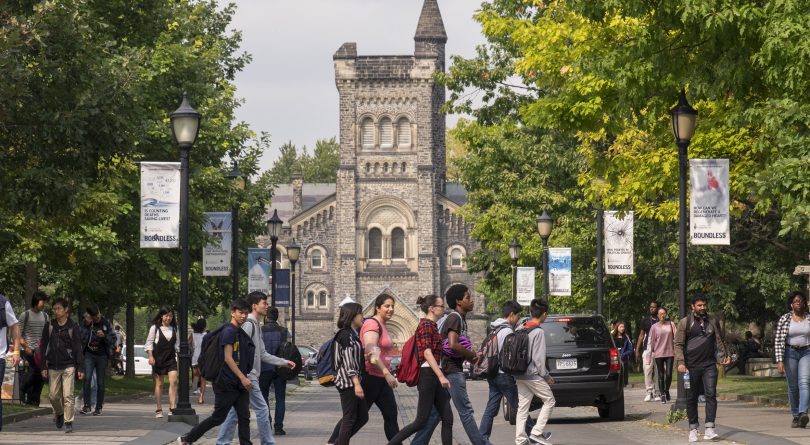Photo Credit: Maclean’s
St. George Campus’ Student Life programs and services in review
Sabrina Daniele, Managing Editor
The University of Toronto’s Office of the Governing Council has released its operating plans for the 2020–21 school year. These plans include Student Life programs and services at the University of Toronto’s (U of T) St. George campus. Several policies have been updated and will be implemented starting the next school year.
The Division of Student Life advocates for every student to participate in university life, build connections, find community, and experience success. The department builds on creating partnerships between programs/services and students.
Student Life operates through Accessibility Services, Centre for International Experience, Career Exploration & Education, Centre for Community Partnerships, Clubs & Leadership Development, Health & Wellness, Multi-Faith Centre, Graduate Student Experience Programs & Services, Housing, Indigenous Student Services/First Nations House, Mentorship & Peer Programs, TCard Services, and Orientation Transition & Engagement. In doing so, Student Life advocates to help students excel both inside and outside of the classroom.
The University Affairs Board approved Operating Plans for Student Life Programs and Services on March 11, 2020. David Newman, the Executive Director of Student Experience, summarized the Operating Plans for 2020–21, which were released in an attached document by the Governing Council.
The Student Life document “Division of Student Life — Operating Plan 2020–2021” provides access to information that focuses on six areas of strategic priority: student development and engagement, internationalization, health and wellness, programs and services for graduate students, academic support, and divisional and university support services. It also provides updated plans of alignment, which include a Mental Health Framework, Policy on Sexual Violence and Sexual Harassment, Student Involvement and Feedback, Truth and Reconciliation, Strategic Mandate Agreement, and an International Strategic Plan.
The document highlights three features from the budget. A new fee structure will be implemented. In doing so, Health & Counselling and Student Services fees will be separated. The second feature will place priority on resources for Health & Counselling fee services. The final feature will focus on the Resiliency Program. Additional resources are being requested at Council of Student Services (COSS) to build the program. This proposal requires COSS approval in order to move forward.
Student Life is working toward a Resiliency Program. This program is a response to students who report feeling overwhelmed and stressed at school. The Operating Plan outlines the benefits a Resiliency Program would offer U of T students. This program could provide an integrated model of support in students’ mental health, assist with stress management, and tackle student loneliness so peers can feel a sense of belonging. The document also outlines components to the Resiliency Program. These include referral, assessment, intake, individual consultation, group sessions and evaluation.
Funding is also expected to change starting the 2020–21 school year. The document compares significant financial changes over two school years, 2019–20 and 2020–21. These changes will come into practice for Student Life.
In 2019–20, 61% of funding was provided by student fees, 26% by university support, 11% by grants, 1% by self-funding, and 1% by other means. In 2020–21, funding for student fees increased to 66%, university support dropped to 25%, grant funding decreased to 8%, self-funding remained at 1%, and other funding was cut to 0%.
Student Life operating expenses fluctuated as well. Scheduled for 2020–21, compensation for the division will be at 76%, higher than 74% in 2019–20. Non-salary expenses are at 19%, compared to 20% last year, and space and occupancy expenses are at 5% for 2020–21, whereas 2019–20 was at 6%.
The document discloses proposed fee increases for St. George full-time and part-time students. For 2020–21, full-time students will be charged $180.36, and part-time students $36.07. The increases in fees are outlined as a 9.8% change from last year: $164.24 for full-time students and $32.85 for part-time students.




